Schmitt C.B. (ed.) The Cambridge History of Renaissance Philosophy
Подождите немного. Документ загружается.


VIII
POLITICAL
PHILOSOPHY
Cambridge Histories Online © Cambridge University Press, 2008

Cambridge Histories Online © Cambridge University Press, 2008
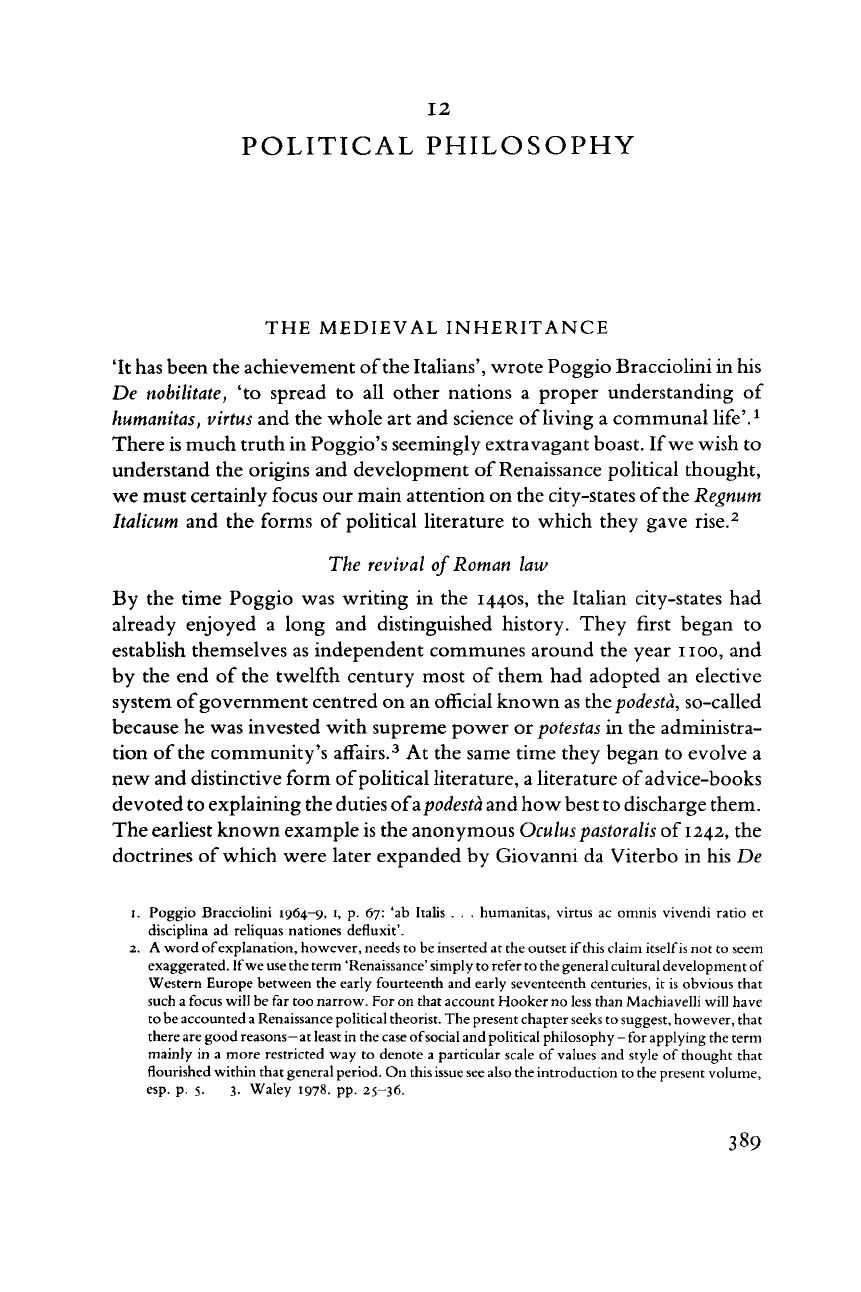
12
THE
MEDIEVAL
INHERITANCE
'It
has been the achievement of the Italians', wrote Poggio Bracciolini in his
De
nobilitate,
'to spread to all other nations a proper understanding of
humanitas,
virtus
and the whole art and science of living a communal life'.
1
There
is much truth in Poggio's seemingly extravagant boast.
If
we wish to
understand the origins and development of Renaissance political thought,
we must certainly focus our main attention on the city-states of the
Regnum
Italicum
and the forms of political literature to which they gave rise.
2
The
revival
of
Roman
law
By
the time Poggio was writing in the
1440s,
the Italian city-states had
already
enjoyed a long and distinguished history.
They
first began to
establish themselves as independent communes around the year
1100,
and
by
the end of the twelfth century most of them had adopted an elective
system of government centred on an official known as the
podestà,
so-called
because he was invested with supreme power or
potestas
in the administra-
tion of the community's affairs.
3
At the same time they began to evolve a
new and distinctive form of political literature, a literature of
advice-books
devoted to explaining the duties of
spodesta
and how best to discharge them.
The
earliest known example is the anonymous
Ocuius
pastoralis
of
1242,
the
doctrines of which were later expanded by Giovanni da Viterbo in his De
1.
Poggio Bracciolini 1964-9, 1, p. 67: 'ab Italis . . . humanitas, virtus ac
omnis
vivendi ratio et
disciplina ad reliquas nationes defluxit'.
2. A word of explanation, however,
needs
to be inserted at the outset if
this
claim itself is not to
seem
exaggerated.
If
we use the term 'Renaissance' simply to refer to the general cultural development of
Western Europe between the early fourteenth and early seventeenth centuries, it is obvious that
such a focus will be far too narrow. For on that account Hooker no
less
than Machiavelli will have
to be accounted a Renaissance political theorist. The present chapter
seeks
to suggest, however, that
there are good
reasons
- at least in the case of social and political philosophy - for applying the term
mainly in a more restricted way to denote a particular scale of values and style of thought that
flourished within that general period. On
this
issue
see
also
the introduction to the present volume,
esp. p. 5. 3. Waley 1978. pp. 25-36.
389
POLITICAL
PHILOSOPHY
Cambridge Histories Online © Cambridge University Press, 2008
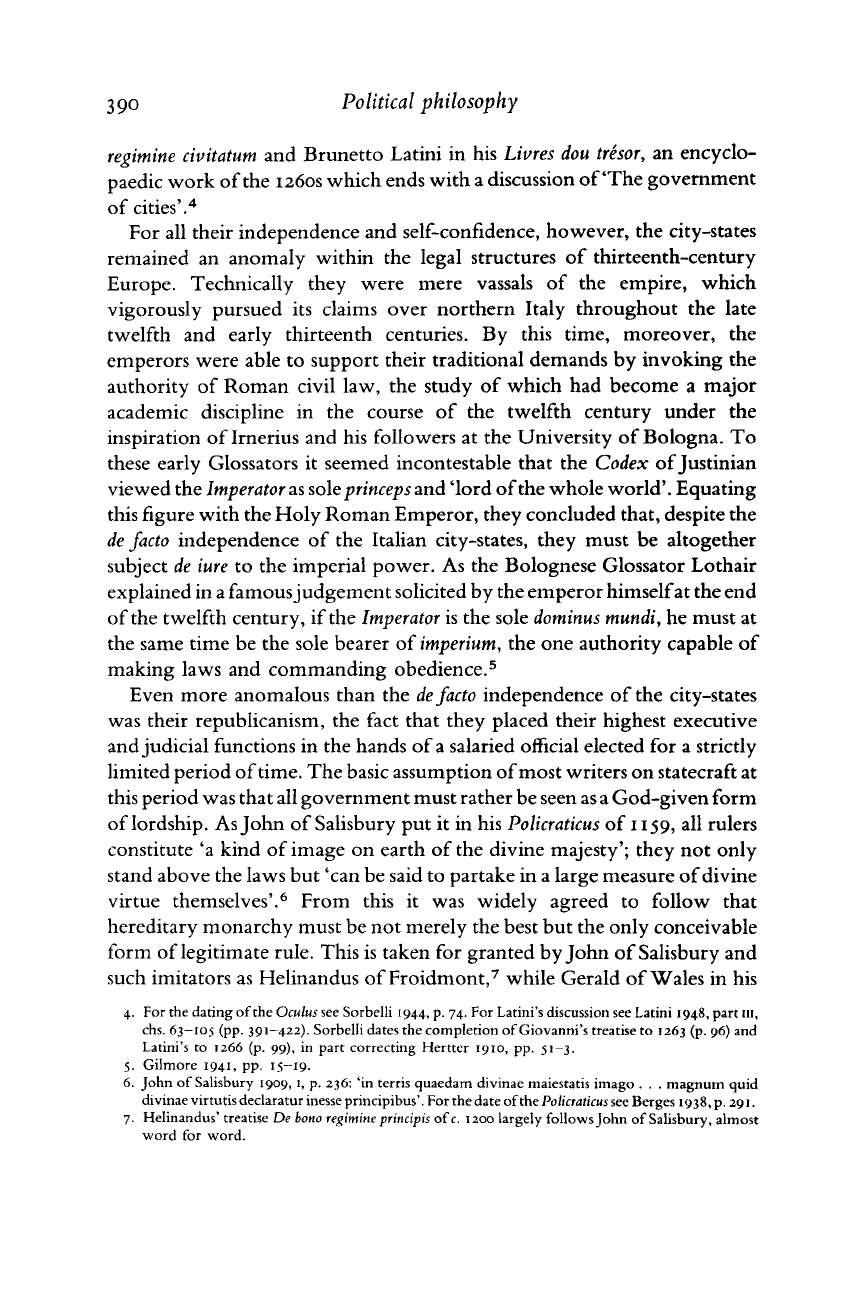
390
Political
philosophy
regimine
civitatum
and Brunetto Latini in his
Livres
dou
trésor,
an encyclo-
paedic work of the
1260s
which ends with a discussion of'The government
of cities'.
4
For
all their independence and self-confidence, however, the city-states
remained an anomaly within the legal structures of thirteenth-century
Europe.
Technically they were mere vassals of the empire, which
vigorously
pursued its claims over northern Italy throughout the late
twelfth and early thirteenth centuries. By this time, moreover, the
emperors were able to support their traditional demands by invoking the
authority
of Roman civil law, the study of which had become a major
academic discipline in the course of the twelfth century under the
inspiration of Irnerius and his followers at the University of Bologna. To
these
early Glossators it
seemed
incontestable that the
Codex
of Justinian
viewed the
Imperator
as
sole
princeps
and 'lord of the whole world'. Equating
this figure with the Holy Roman Emperor, they concluded that, despite the
de
facto
independence of the Italian city-states, they must be altogether
subject
de
iure
to the imperial power. As the Bolognese Glossator Lothair
explained in
a
famous
judgement
solicited by the emperor himself
at
the end
of the twelfth century, if the
Imperator
is the
sole
dominus
mundi, he must at
the same time be the
sole
bearer of
imperium,
the one authority capable of
making
laws and commanding obedience.
5
Even
more anomalous than the
de
facto
independence of the city-states
was their republicanism, the fact that they placed their highest executive
and
judicial
functions in the hands of
a
salaried official elected for a strictly
limited period of time. The basic assumption of most writers on statecraft at
this period was that all government must rather be
seen
as
a
God-given
form
of
lordship.
As
John of Salisbury put it in his
Polleraticus
of
1159,
all rulers
constitute 'a kind of image on earth of the divine majesty'; they not only
stand above the laws but 'can be said to partake in a large measure of divine
virtue
themselves'.
6
From this it was widely agreed to follow that
hereditary
monarchy must be not merely the best but the only conceivable
form of legitimate rule. This is taken for granted by John of
Salisbury
and
such imitators as Helinandus of Froidmont,
7
while Gerald of Wales in his
4. For the dating of the
Oculus
see Sorbelli 1944, p. 74. For Latini's discussion see Latini 1948, part in,
chs.
63-105 (pp. 391-422). Sorbelli dates the completion of
Giovanni's
treatise to 1263 (p. 96) and
Latini's
to 1266 (p. 99), in part correcting Hertter 1910, pp. 51-3.
5.
Gilmore 1941, pp.
15-19.
6. John of Salisbury 1909,1, p. 236: 'in terris quaedam divinae maiestatis imago . . . magnum quid
divinae
virtu
tis declaratur
inesse
principibus'. For the date of the
Policraticus
see Berges 193 8, p. 291.
7.
Helinandus' treatise De
bono
regimine
principis
of
c.
1200 largely follows John of Salisbury, almost
word
for word.
Cambridge Histories Online © Cambridge University Press, 2008
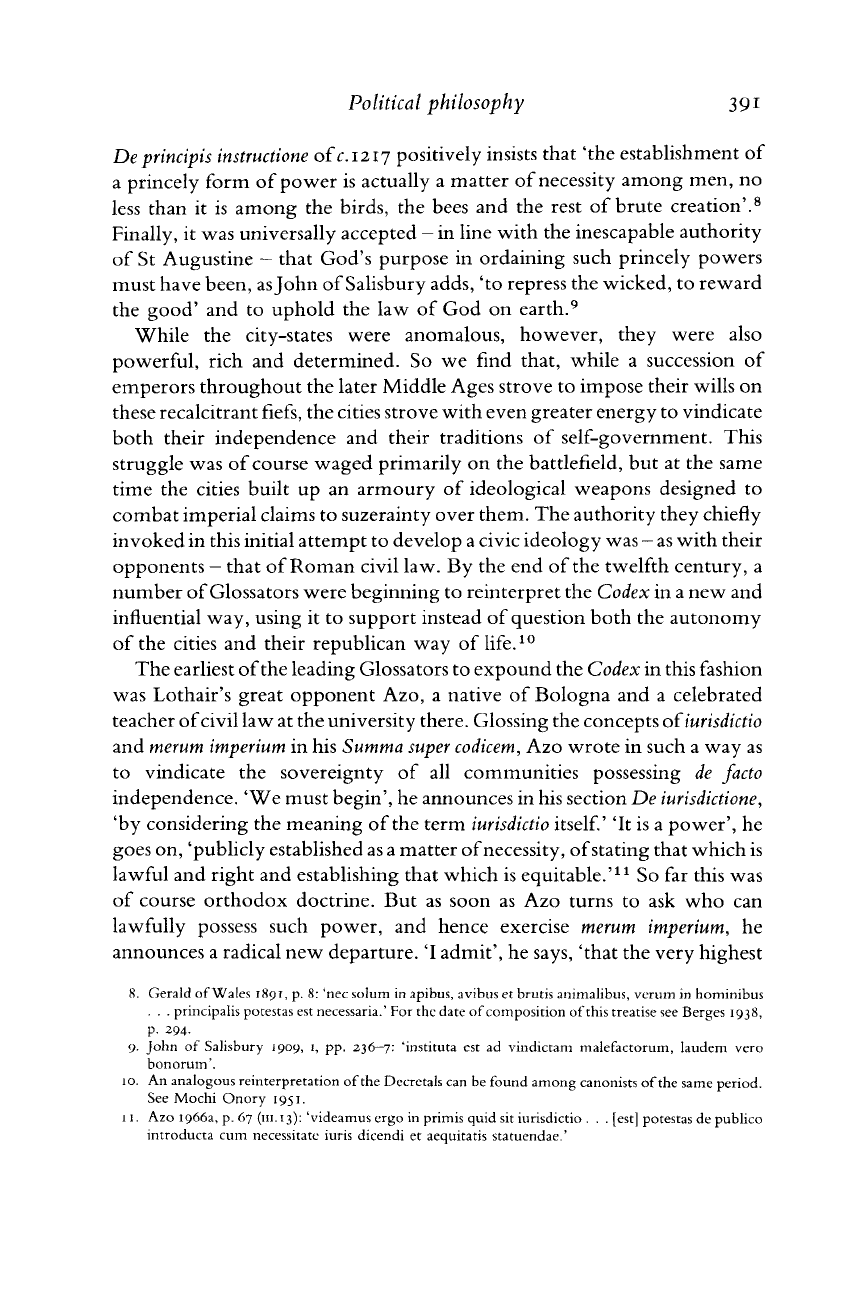
Political
philosophy
391
De
principis instructione
of
c.1217
positively insists
that
'the
establishment
of
a princely form
of
power
is
actually
a
matter
of
necessity among
men, no
less
than
it is
among
the
birds,
the
bees
and the
rest
of
brute
creation'.
8
Finally,
it
was universally accepted
- in
line with
the
inescapable authority
of
St
Augustine
-
that
God's purpose
in
ordaining such princely powers
must have been, as
John
of
Salisbury adds,
'to
repress
the
wicked,
to
reward
the good'
and to
uphold
the law of
God
on
earth.
9
While
the
city-states were anomalous, however, they were also
powerful,
rich
and
determined.
So we
find
that,
while
a
succession
of
emperors throughout
the
later Middle
Ages
strove
to
impose their
wills
on
these recalcitrant
fiefs,
the
cities strove with even greater energy
to
vindicate
both their independence
and
their traditions
of
self-government. This
struggle
was of
course waged primarily
on the
battlefield,
but at the
same
time
the
cities built
up an
armoury
of
ideological weapons designed
to
combat imperial claims
to
suzerainty over them. The authority they
chiefly
invoked
in
this initial attempt
to
develop
a
civic
ideology was
—
as with their
opponents
—
that
of
Roman
civil
law.
By the end of
the twelfth century,
a
number
of
Glossators
were beginning
to
reinterpret
the
Codex
in a
new
and
influential way, using
it to
support instead
of
question both
the
autonomy
of
the
cities
and
their republican
way of
life.
10
The
earliest
of
the leading Glossators
to
expound
the
Codex
in
this fashion
was
Lothair's great opponent Azo,
a
native
of
Bologna
and a
celebrated
teacher
of
civil
law
at the
university there. Glossing
the
concepts ofiurisdictio
and
merum
imperium
in
his
Summa
super codicem, Azo wrote
in
such
a
way
as
to vindicate
the
sovereignty
of all
communities possessing
de
facto
independence. 'We must begin',
he
announces
in
his section
De
iurisdictione,
'by
considering
the
meaning
of
the term iurisdictio itself
'It is a
power',
he
goes
on, 'publicly established as
a
matter
of
necessity,
of
stating
that
which
is
lawful
and
right
and
establishing
that
which
is
equitable.'
11
So far
this
was
of
course orthodox doctrine.
But as
soon
as Azo
turns
to ask who can
lawfully
possess such power,
and
hence exercise
merum
imperium,
he
announces
a
radical new departure.
'I
admit',
he
says,
'that
the
very highest
8. Gerald of Wales 1891, p. 8: 'nec solum in apibus, avibus et brutis animalibus, verum in hominibus
.
. . principalis potestas est necessaria.' For the date of composition of this treatise see Berges 1938,
p.
294.
9. John of Salisbury 1909, 1, pp.
236-7:
'instituta est ad vindictam malefactorum, laudem vero
bonorum'.
10.
An analogous reinterpretation of the Decretals can be found among canonists of the same period.
See Mochi Onory 1951.
11.
Azo
1966a,
p. 67 (in. 13): 'videamus ergo in primis quid sit iurisdictio . . . [est] potestas de publico
introducta
cum necessitate iuris dicendi et aequitatis statuendae.'
Cambridge Histories Online © Cambridge University Press, 2008
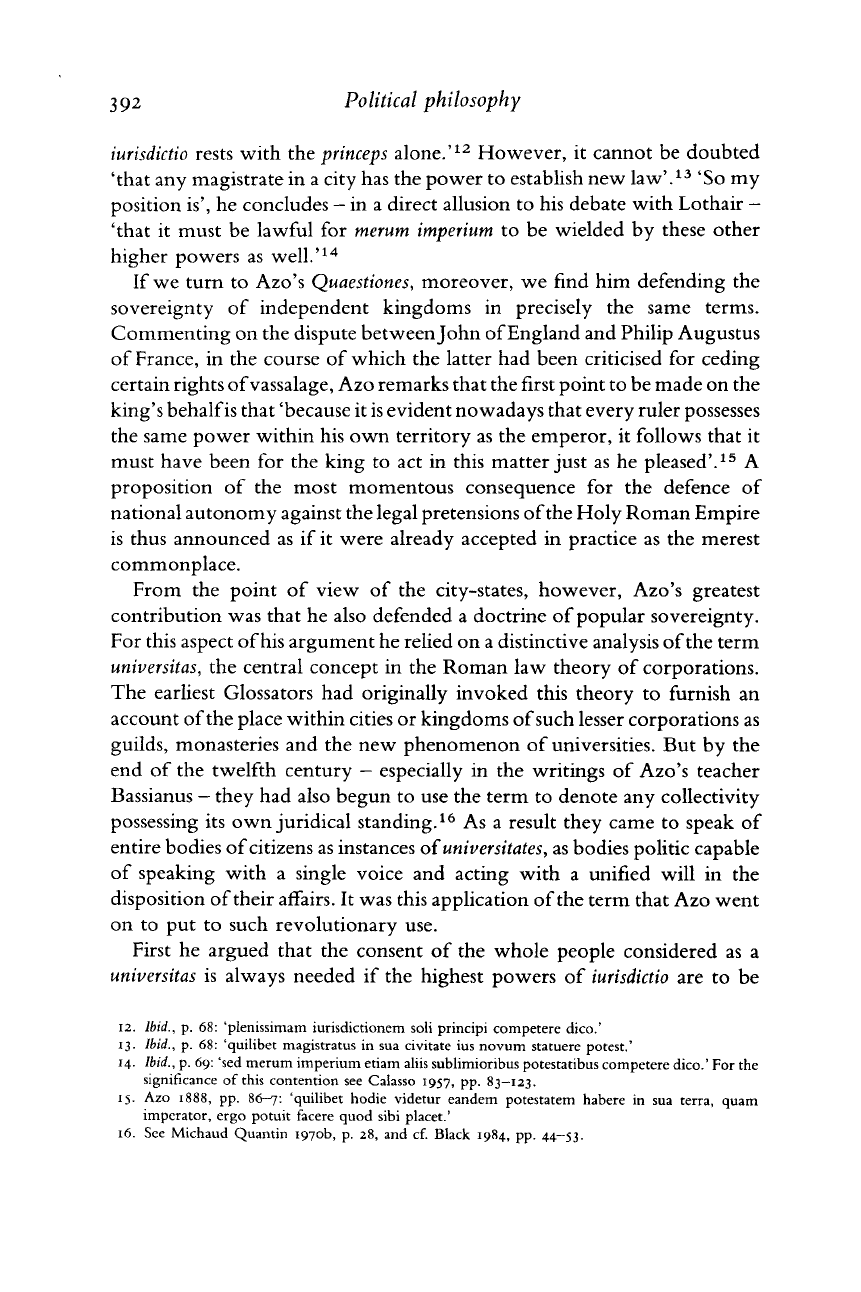
392
Political
philosophy
iurisdictio rests with
the
princeps alone.'
12
However,
it
cannot
be
doubted
'that
any
magistrate
in a
city
has the
power
to
establish
new
law'.
13
'So my
position is',
he
concludes
—
in a
direct allusion
to his
debate with Lothair
—
'that
it
must
be
lawful
for merum
imperium
to be
wielded
by
these other
higher powers
as
well.'
14
If
we turn to
Azo's
Quaestiones, moreover,
we
find
him
defending
the
sovereignty
of
independent kingdoms
in
precisely
the
same terms.
Commenting
on the
dispute between
John
of
England
and
Philip Augustus
of
France,
in the
course
of
which
the
latter
had
been criticised
for
ceding
certain rights
of
vassalage,
Azo remarks
that
the
first point
to be
made
on the
king's
behalf
is
that
'because
it
is evident nowadays
that
every ruler possesses
the same power within
his own
territory
as the
emperor,
it
follows
that
it
must have been
for the
king
to act in
this matter just
as he
pleased'.
15
A
proposition
of the
most momentous consequence
for the
defence
of
national autonomy against
the
legal pretensions
of
the Holy Roman Empire
is
thus
announced
as if it
were already accepted
in
practice
as the
merest
commonplace.
From
the
point
of
view
of the
city-states, however,
Azo's
greatest
contribution
was
that
he
also defended
a
doctrine
of
popular sovereignty.
For this aspect
of
his argument
he
relied
on a
distinctive analysis
of
the term
universitas,
the
central concept
in the
Roman
law
theory
of
corporations.
The
earliest Glossators
had
originally invoked this theory
to
furnish
an
account
of
the place within cities
or
kingdoms
of
such lesser corporations
as
guilds,
monasteries
and the new
phenomenon
of
universities.
But by the
end
of the
twelfth century
-
especially
in the
writings
of
Azo's
teacher
Bassianus
-
they
had
also begun
to use the
term
to
denote
any
collectivity
possessing
its
own juridical standing.
16
As a
result they came
to
speak
of
entire bodies
of
citizens
as
instances
of
universitates,
as
bodies politic capable
of
speaking with
a
single
voice
and
acting with
a
unified
will
in the
disposition
of
their affairs.
It
was this application
of
the term
that
Azo went
on
to put to
such revolutionary
use.
First
he
argued
that
the
consent
of the
whole people considered
as a
universitas
is
always needed
if the
highest powers
of
iurisdictio
are to be
12.
Ibid.,
p. 68: 'plenissimam iurisdictionem
soli
principi competere dico.'
13.
Ibid.,
p. 68: 'quilibet magistratus in sua civitate ius novum statuere potest.'
14. Ibid.,
p. 69: 'sed merum imperium etiam aliis sublimioribus potestatibus competere dico.' For the
significance of this contention see Calasso 1957, pp. 83-123.
15.
Azo 1888, pp. 86-7: 'quilibet hodie videtur eandem potestatem habere in sua terra, quam
imperator, ergo potuit facere quod sibi placet.'
16.
See Michaud Quantin 1970b, p. 28, and cf. Black 1984, pp. 44-53.
Cambridge Histories Online © Cambridge University Press, 2008
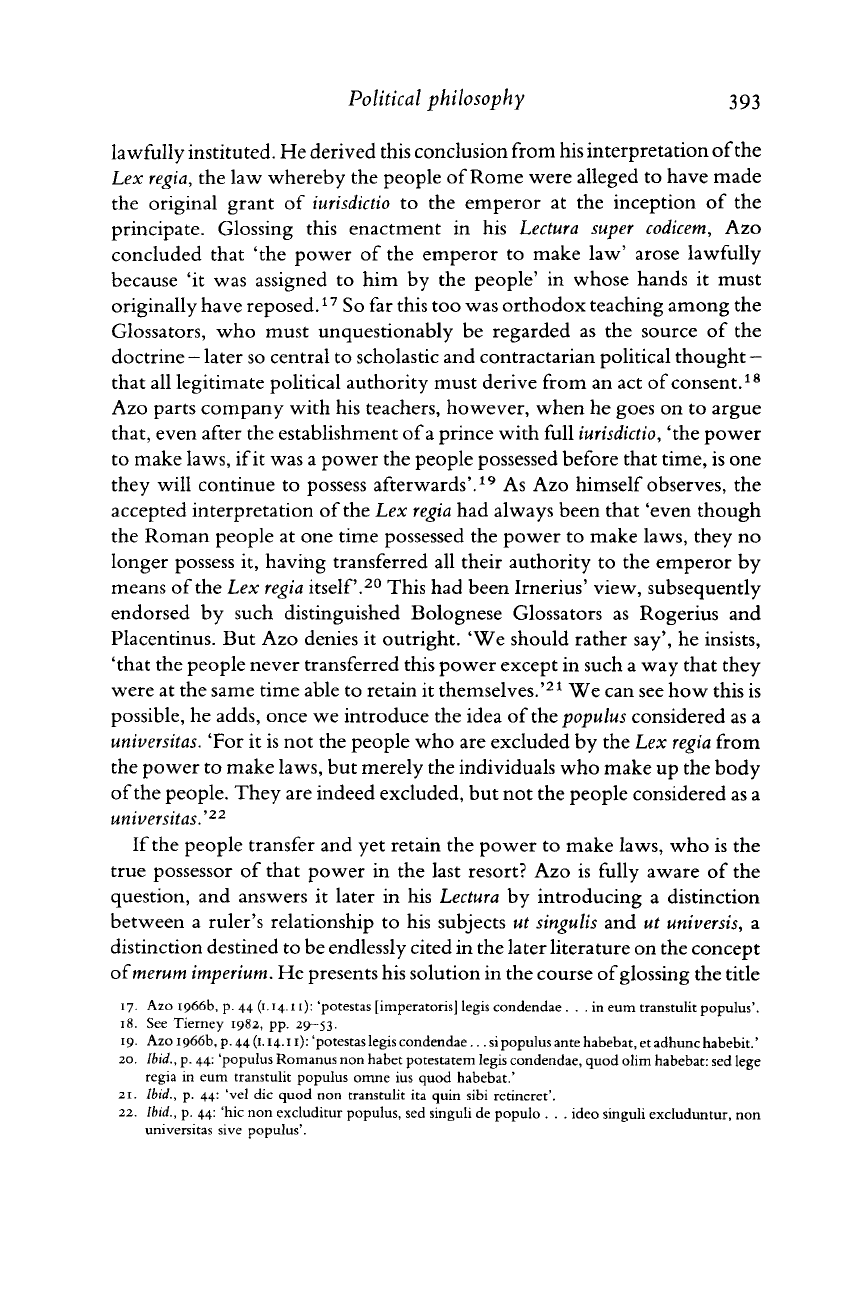
Political
philosophy
393
lawfully
instituted.
He
derived this conclusion from his interpretation
of
the
Lex regia,
the law
whereby
the
people
of
Rome
were alleged
to
have made
the original grant
of
iurisdictio
to the
emperor
at the
inception
of the
principate. Glossing this enactment
in his
Lectura super codicem,
Azo
concluded
that
'the
power
of the
emperor
to
make
law'
arose
lawfully
because
'it was
assigned
to him by the
people'
in
whose hands
it
must
originally
have reposed.
17
So far
this
too
was orthodox teaching among
the
Glossators,
who
must unquestionably
be
regarded
as the
source
of the
doctrine
—
later
so
central
to
scholastic
and
contractarian political thought
—
that
all
legitimate political authority must derive from
an act of
consent.
18
Azo
parts
company with
his
teachers, however, when
he
goes
on to
argue
that,
even after
the
establishment
of
a prince with
full
iurisdictio,
'the
power
to make
laws,
if
it was
a
power
the
people possessed before
that
time,
is one
they
will
continue
to
possess afterwards'.
19
As
Azo himself observes,
the
accepted
interpretation
of the Lex
regia
had
always been
that
'even though
the Roman people
at one
time possessed
the
power
to
make
laws,
they
no
longer
possess
it,
having transferred
all
their authority
to the
emperor
by
means
of the Lex
regia itself'.
20
This
had
been Irnerius'
view,
subsequently
endorsed
by
such distinguished Bolognese Glossators
as
Rogerius
and
Placentinus.
But
Azo denies
it
outright.
'We
should
rather
say',
he
insists,
'that
the
people never transferred this power except
in
such
a
way
that
they
were
at the
same time able
to
retain
it
themselves.'
21
We can
see
how
this
is
possible,
he
adds, once
we
introduce
the
idea
of the
populus considered
as a
universitas.
'For it is not the
people
who are
excluded
by the Lex
regia from
the power
to
make
laws,
but
merely
the
individuals
who
make
up the
body
of
the people. They
are
indeed excluded,
but not the
people considered
as a
universitas.'
22
If
the
people transfer
and yet
retain
the
power
to
make
laws,
who is the
true
possessor
of
that
power
in the
last resort?
Azo is
fully
aware
of the
question,
and
answers
it
later
in his
Lectura
by
introducing
a
distinction
between
a
ruler's relationship
to his
subjects
ut
singulis
and ut
universis,
a.
distinction destined
to be
endlessly cited
in the
later literature
on the
concept
oimerum
imperium.
He
presents his solution
in the
course
of
glossing
the
title
17.
Azo 1966b, p. 44
(1.14.11):
'potestas [imperatoris] legis condendae ... in eum transtulit populus'.
18.
See Tierney 1982, pp. 29-53.
19.
Azo 1966b, p. 44
(1.14.11):
'potestas legis condendae... si populus ante habebat, et adhunc habebit.'
20.
Ibid.,
p. 44: 'populus Romanus non habet potestatem legis condendae, quod olim habebat: sed lege
regia
in eum transtulit populus omne ius quod habebat.'
21.
Ibid.,
p. 44: 'vel die quod non transtulit ita quin sibi retineret'.
22. Ibid.,
p. 44: 'hie non excluditur populus, sed singuli de populo . . . ideo singuli excluduntur, non
universitas sive populus'.
Cambridge Histories Online © Cambridge University Press, 2008
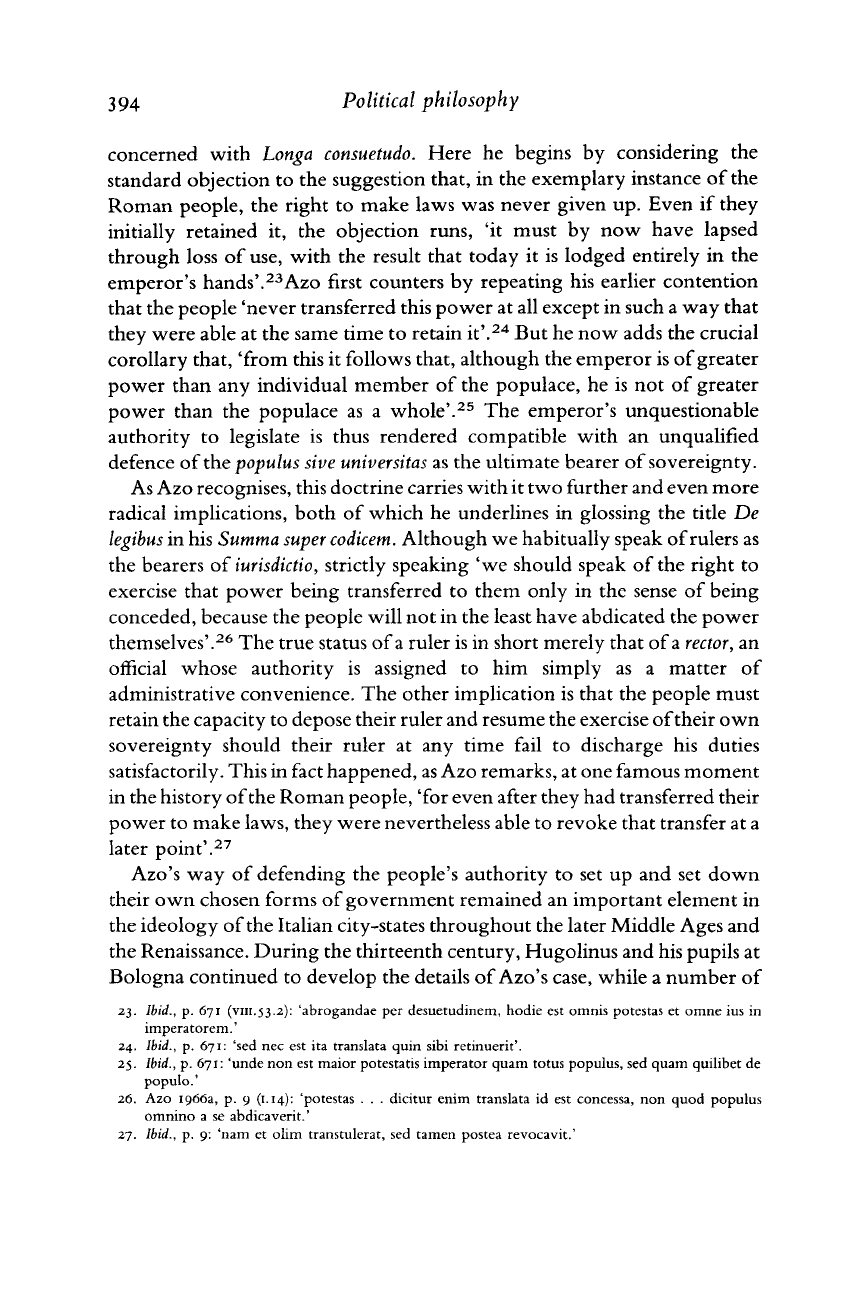
394
Political
philosophy
concerned with Longa consuetude Here he begins by considering the
standard objection to the suggestion
that,
in the exemplary instance of the
Roman people, the right to make laws was never
given
up. Even if they
initially
retained it, the objection runs, 'it must by now have lapsed
through loss of use, with the result
that
today it is lodged entirely in the
emperor's hands'.
23
Azo first counters by repeating his earlier contention
that
the people 'never transferred this power at all except in such a way
that
they were able at the same time to retain it'.
24
But he now adds the crucial
corollary
that,
'from this it
follows
that,
although the emperor is
of
greater
power
than any individual member of the populace, he is not of greater
power
than the populace as a whole'.
25
The emperor's unquestionable
authority to legislate is thus rendered compatible with an unqualified
defence
of the populus sive universitas as the ultimate bearer of sovereignty.
As
Azo recognises, this doctrine carries with it two further and even more
radical implications, both of which he underlines in glossing the title De
legibus in his
Summa
super codicem. Although we habitually speak
of
rulers as
the bearers of iurisdictio, strictly speaking 'we should speak of the right to
exercise
that
power being transferred to them only in the sense of being
conceded,
because the people
will
not in the least have abdicated the power
themselves'.
26
The
true
status
of
a ruler is in short merely
that
of
a rector, an
official
whose authority is assigned to him simply as a matter of
administrative convenience. The other implication is
that
the people must
retain the capacity to depose their ruler and resume the exercise
of
their own
sovereignty
should their ruler at any time
fail
to discharge his duties
satisfactorily.
This in fact happened, as Azo remarks, at one famous moment
in the history
of
the Roman people, 'for even after they had transferred their
power
to make
laws,
they were nevertheless able to revoke
that
transfer at a
later point'.
27
Azo's
way of defending the people's authority to set up and set down
their own chosen forms of government remained an important element in
the ideology
of
the Italian city-states throughout the later Middle
Ages
and
the Renaissance. During the thirteenth century, Hugolinus and his pupils at
Bologna
continued to develop the details of
Azo's
case, while a number of
23. Ibid., p. 671
(vm.53.2):
'abrogandae
per
desuetudinem,
hodie
est
omnis
potestas
et
omne
ius in
imperatorem.'
24. Ibid., p. 671: 'sed nec est ita
translata
quin
sibi
retinuerit'.
25. Ibid., p. 671:
'unde
non est
maior
potestatis
imperator
quam
totus
populus,
sed
quam
quilibet
de
populo.'
26. Azo
1966a,
p. 9 (1.14):
'potestas
. . .
dicitur
enim
translata
id est
concessa,
non
quod
populus
omnino
a se
abdicaverit.'
27. Ibid., p. 9: 'nam et
olim
transtulerat,
sed
tamen
postea
revocavit.'
Cambridge Histories Online © Cambridge University Press, 2008
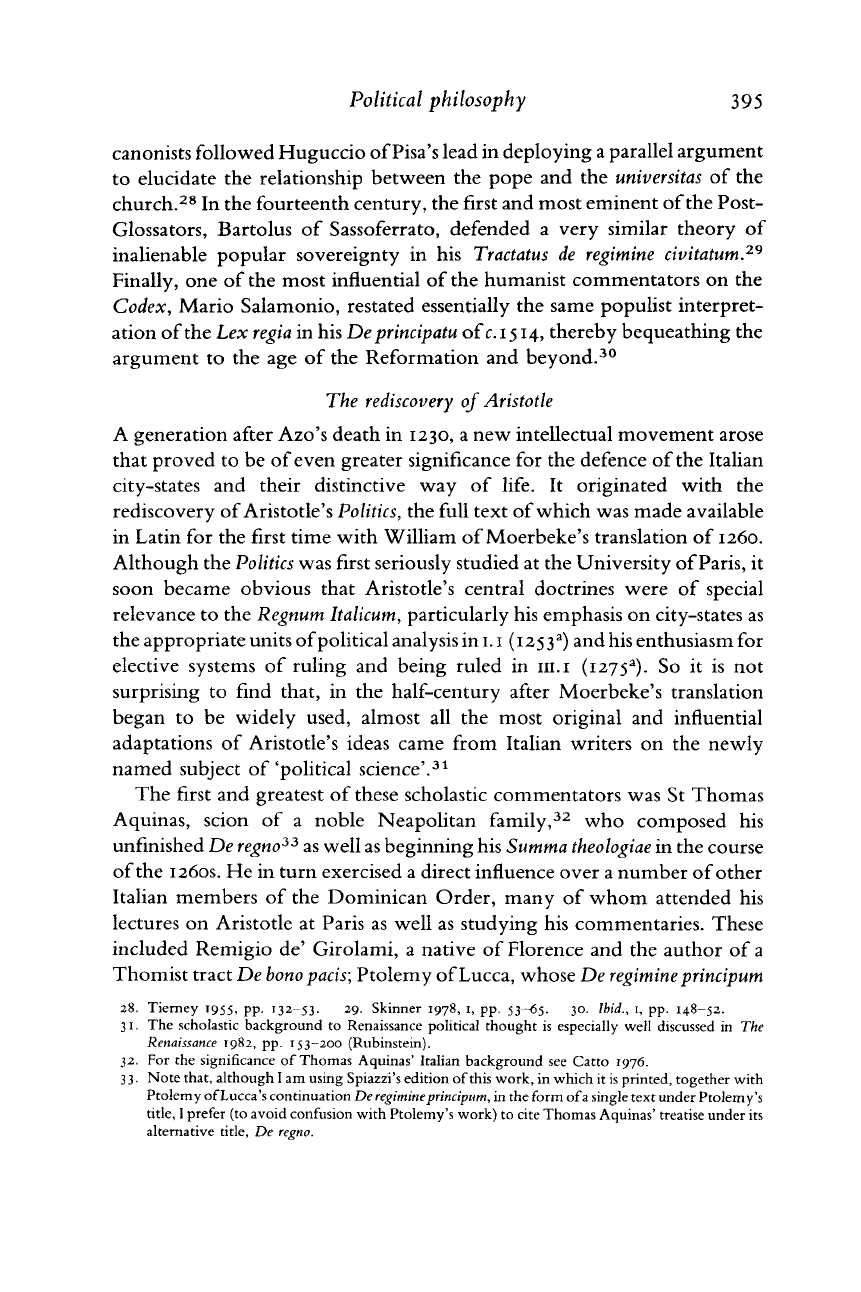
Political
philosophy
395
canonists followed Huguccio
of
Pisa's lead
in
deploying
a
parallel argument
to elucidate
the
relationship between
the
pope
and the
universitas
of the
church.
28
In the
fourteenth century,
the
first
and
most eminent
of
the Post-
Glossators,
Bartolus
of
Sassoferrato, defended
a
very similar theory
of
inalienable popular sovereignty
in his
Tractatus
de
regimine civitatum
29
Finally,
one of the
most influential
of the
humanist commentators
on the
Codex,
Mario Salamonio, restated essentially
the
same populist interpret-
ation
of
the
Lex
regia
in his De
principatu
of
c.
1514,
thereby bequeathing
the
argument
to the age of the
Reformation
and
beyond.
30
The
rediscovery
of
Aristotle
A
generation after
Azo's
death
in
1230,
a new
intellectual movement arose
that
proved
to be
of
even
greater significance
for the
defence
of the
Italian
city-states
and
their distinctive
way of
life.
It
originated with
the
rediscovery
of
Aristotle's
Politics,
the
full text
of
which
was
made available
in Latin
for the
first time with William
of
Moerbeke's translation
of
1260.
Although
the
Politics was first seriously studied
at the
University
of
Paris,
it
soon
became obvious
that
Aristotle's central doctrines were
of
special
relevance
to the
Regnum
Italicum, particularly
his
emphasis
on
city-states
as
the appropriate units
of
political
analysis
in
1.1
(1253
s
)
and
his enthusiasm
for
elective
systems
of
ruling
and
being ruled
in
III.I
(i275
a
).
So it is not
surprising
to
find
that,
in the
half-century after Moerbeke's translation
began
to be
widely used, almost
all the
most original
and
influential
adaptations
of
Aristotle's ideas came from Italian writers
on the
newly
named subject
of
'political science'.
31
The
first
and
greatest
of
these scholastic commentators
was St
Thomas
Aquinas,
scion
of a
noble Neapolitan family,
32
who
composed
his
unfinished
De
regno
33
as
well
as beginning
his
Summa
theologiae
in the
course
of
the 1260s.
He in turn
exercised
a
direct influence over
a
number
of
other
Italian members
of the
Dominican Order, many
of
whom attended
his
lectures
on
Aristotle
at
Paris
as
well
as
studying
his
commentaries. These
included Remigio
de'
Girolami,
a
native
of
Florence
and the
author
of a
Thomist
tract
De
bono pads; Ptolemy
of
Lucca,
whose
De
regimine principum
28. Tierney 1955, pp.
132-53.
29. Skinner 1978, 1, pp. 53-65. 30.
Ibid.,
1, pp. 148-52.
31.
The scholastic background to Renaissance political thought is especially well discussed in The
Renaissance
1982, pp. 153-200 (Rubinstein).
32.
For the significance of Thomas Aquinas' Italian background see
Catto
1976.
33.
Note that, although I am using Spiazzi's edition of this work, in which it is printed, together with
Ptolemy of
Lucca's
continuation De
regimine principum,
in the form of a single text under Ptolemy's
title, I prefer (to avoid confusion with Ptolemy's work) to cite Thomas Aquinas' treatise under its
alternative title, De
regno.
Cambridge Histories Online © Cambridge University Press, 2008
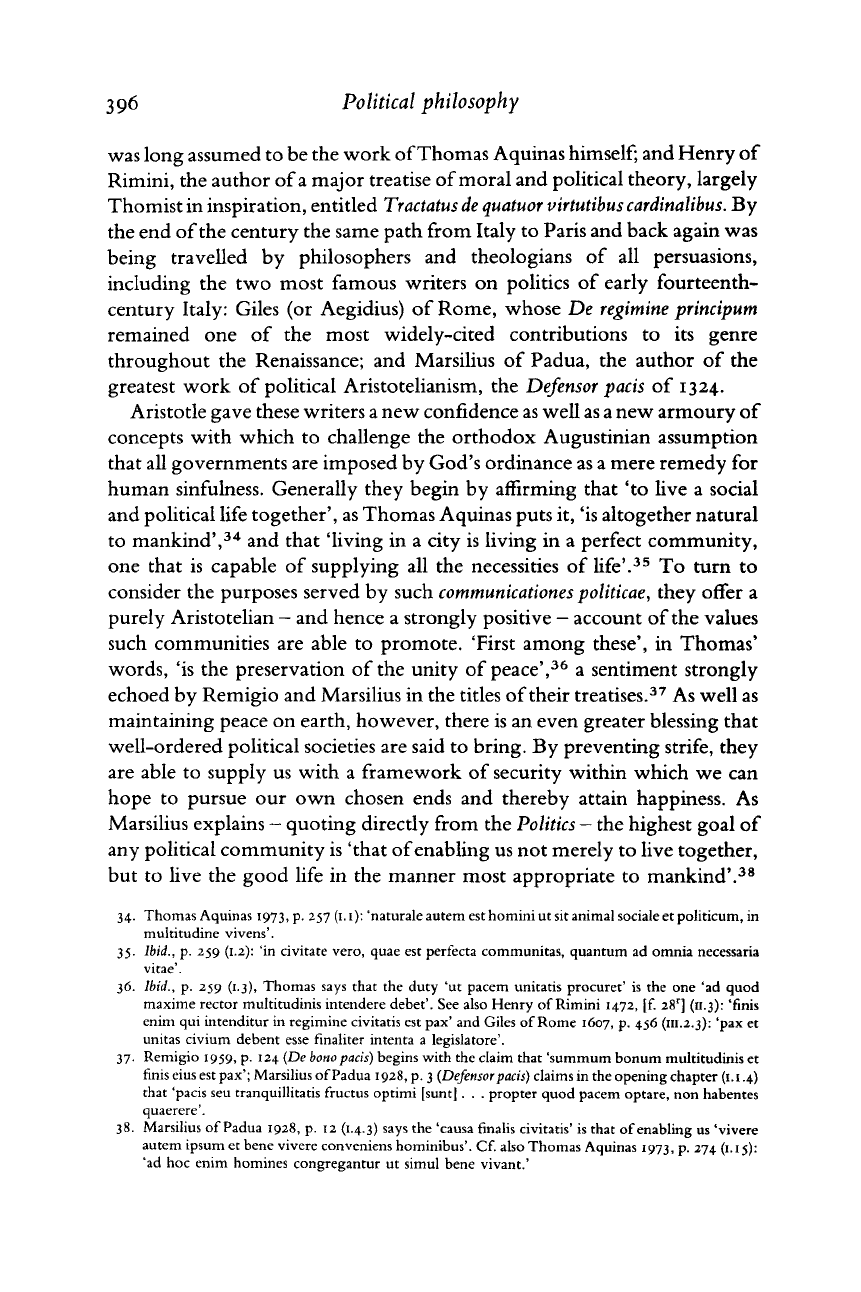
396
Political
philosophy
was long assumed to be the work of
Thomas
Aquinas
himself;
and Henry of
Rimini,
the author of a major treatise of moral and political theory, largely
Thomist
in inspiration, entitled
Tractatus
de
quatuor
virtutihus
cardinalibus.
By
the end of the century the same path from Italy to Paris and
back
again was
being travelled by philosophers and theologians of all persuasions,
including the two most famous writers on politics of early fourteenth-
century Italy: Giles (or Aegidius) of Rome, whose De
regimine
principum
remained one of the most widely-cited contributions to its genre
throughout the Renaissance; and Marsilius of Padua, the author of the
greatest work of political Aristotelianism, the
Defensor
pads
of 1324.
Aristotle
gave
these
writers a new confidence as well as a new armoury of
concepts with which to challenge the orthodox Augustinian assumption
that
all governments are imposed by God's ordinance as a mere remedy for
human sinfulness. Generally they begin by affirming that 'to live a social
and political life together', as Thomas Aquinas puts it, 'is altogether natural
to mankind',
34
and that 'living in a city is living in a perfect community,
one that is capable of supplying all the
necessities
of life'.
35
To turn to
consider the purposes served by such
communicationes
politicae,
they offer a
purely Aristotelian - and hence a strongly positive - account of the values
such communities are able to promote. 'First among these', in Thomas'
words, 'is the preservation of the unity of peace',
36
a sentiment strongly
echoed by Remigio and Marsilius in the titles of their treatises.
37
As well as
maintaining peace on earth, however, there is an even greater blessing that
well-ordered political
societies
are said to bring. By preventing strife, they
are able to supply us with a framework of security within which we can
hope to pursue our own chosen ends and thereby attain happiness. As
Marsilius explains - quoting directly from the
Politics
- the highest goal of
any
political community is 'that of enabling us not merely to live together,
but
to live the good life in the manner most appropriate to mankind'.
38
34. Thomas Aquinas 1973, p. 257
(1.1):
'naturale autem est homini ut sit animal sociale et politicum, in
multitudine vivens'.
35.
Ibid.,
p. 259
(1.2):
'in civitate vero, quae est perfecta communitas, quantum ad omnia necessaria
vitae'.
36.
Ibid.,
p. 259
(1.3),
Thomas says that the duty 'ut pacem unitatis procuret' is the one 'ad quod
maxime rector multitudinis intendere debet'. See also Henry of Rimini 1472, [f. 28
r
]
(11.3):
'finis
enim qui intenditur in regimine civitatis est pax' and Giles of Rome 1607, p. 456
(111.2.3):
'pax et
unitas civium debent
esse
finaliter intenta a legislatore'.
37.
Remigio 1959, p. 124 (De
bono
pads)
begins with the claim that 'summum bonum multitudinis et
finis
eius
est pax'; Marsilius of
Padua
1928, p. 3
(Defensor
pads)
claims in the opening chapter
(1.1.4)
that
'pads seu tranquillitatis fructus optimi
[sunt]
. . . propter quod pacem optare, non habentes
quaerere'.
38. Marsilius of Padua 1928, p. 12 (1.4.3) says the 'causa finalis civitatis' is that of enabling us 'vivere
autem ipsum et bene vivere conveniens hominibus'. Cf. also Thomas Aquinas 1973, p. 274
(1.15):
'ad
hoc enim homines congregantur ut simul bene vivant.'
Cambridge Histories Online © Cambridge University Press, 2008
